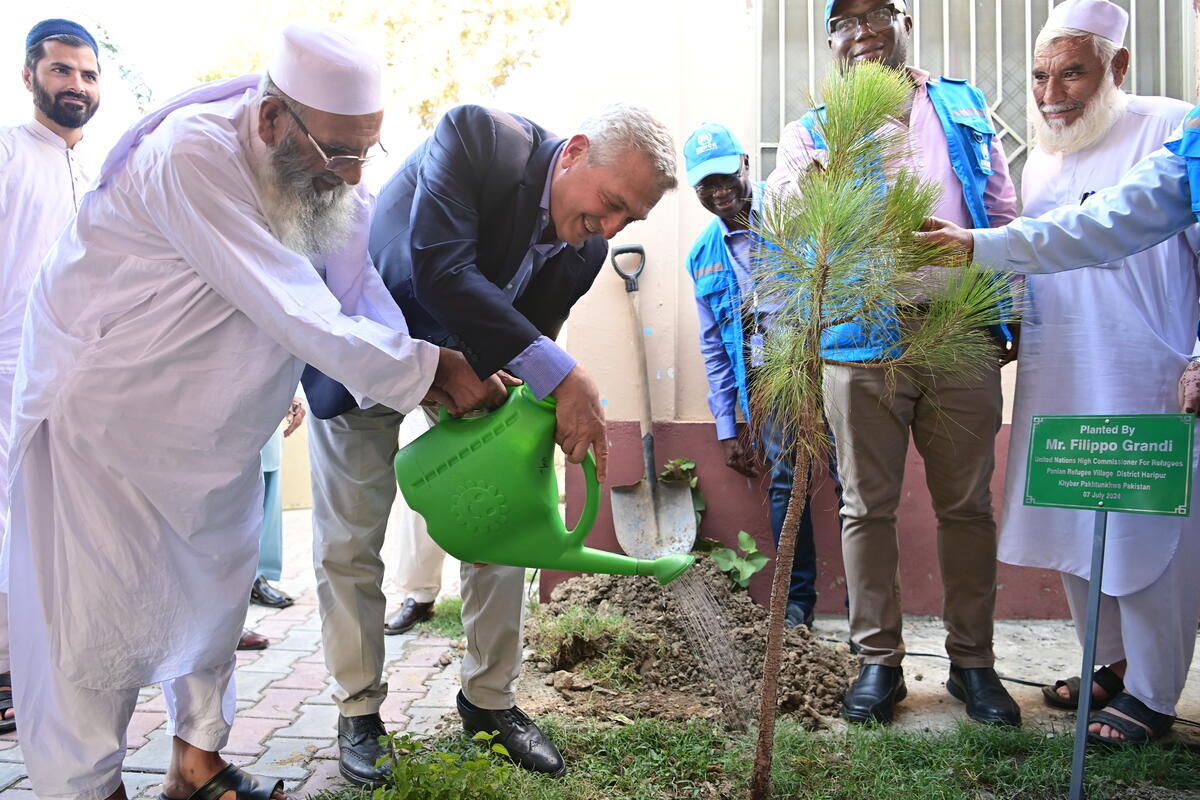Afghanistan Humanitarian Update No. 10
Afghanistan Humanitarian Update No. 10
At a Glance:
- The first UNHCR emergency airlift flight carrying 44 metric tons of plastic sheeting arrives in Quetta, Pakistan.
- Thousands of Afghans are managing to cross the border into Pakistan, despite official border closure.
- UNHCR receives pledges of US $12 million so far in response to US $268 million funding appeal.
UNHCR Airlift Begins
The first UNHCR emergency airlift flight carrying 44 metric tons of plastic sheeting arrived in Quetta, Pakistan, Saturday afternoon. The Ilyushin-76 cargo plane carried 9,800 plastic tarpaulins from UNHCR's regional stockpiles in Copenhagen, Denmark. It landed in Quetta at 1:40 p.m. local time and will continue to shuttle between Quetta and Copenhagen, delivering more supplies in preparation for a possible influx of hundreds of thousands of Afghans. UNHCR Quetta is looking for an additional 3,000 square metres of warehouse space to make room for the additional supplies.
The 9,800 plastic tarpaulins on the first airlift could provide emergency shelter for more than 50,000 people. These plastic tarpaulins and the additional materials being airlifted on later flights will significantly boost UNHCR's shelter stocks in Pakistan. The agency already has 9,300 tents in Pakistan, and another 20,000 are being produced by local suppliers.
The emergency airlift is part of UNHCR's $268 million contingency plan for the region, covering a possible influx of up to 1.5 million Afghans into neighbouring countries. The plan, described by UNHCR officials as "worst-case," calls for preparations for up to 1 million additional Afghans in Pakistan; up to 400,000 in Iran; up to 50,000 each in Turkmenistan and Tajikistan; and up to 10,000 in Uzbekistan. Pakistan and Iran already host more than 3.5 million Afghans who have fled their strife-torn nation over the past two decades because of war, drought and looming famine.
Borders
While the border between Afghanistan and Pakistan remains officially shut, thousands of Afghans are trickling into Pakistan through the mountains. Most are staying with relatives and friends or trying to blend into existing Afghan refugee settlements in an effort not to attract attention.
One local man in Quetta said he was hosting 25 Afghan refugees while another said he accommodated 16. Those crossing are mostly women and children. The refugees say most men stay behind in Afghanistan to keep an eye on their property or accompany their families across the border and then go straight back to look after livestock and crops.
Some of the refugees who arrived in the Quetta region over the past few days told UNHCR they had started their arduous journey even before the September 11 attack, driven out by drought and extreme poverty. Others say they left in the wake of the attacks.
Afghans arriving from Kandahar say the city was gripped by panic on September 12 with thousands of people leaving hastily - some people did not even collect laundry drying outside their homes. One woman said that her husband returned home in such a panic that the family left the city in less than an hour, with their only belongings in an empty flour sack. They said prices of food in Kandahar nearly doubled in the wake of the September 11 attacks.
Refugees say those leaving cities for the countryside have to brave banditry on the roads and extortion. Many of the people who have fled into the Quetta region are ethnic Pashtuns, but there are also representatives of ethnic minorities among them.
Funding
UNHCR's donors are responding well to the funding appeal launched earlier this week. The agency has so far received more than $12 million in direct pledges to UNHCR from several governments. They include: United Kingdom ($3.3 million), United States ($4 million), Germany ($3.5 million), Denmark ($1 million) and Greece ($500,000). American actress and UNHCR Goodwill Ambassador Angelina Jolie contributed $1 million to the Afghanistan emergency - the largest donation ever to UNHCR by a private individual.
UNHCR has appealed for $268 million to tackle a possible large-scale emergency in and around Afghanistan, part of an overall United Nations consolidated appeal of $584 million. In the short term, UNHCR urgently needs $30 million to be able to handle a possible influx of the first 100,000 people.









